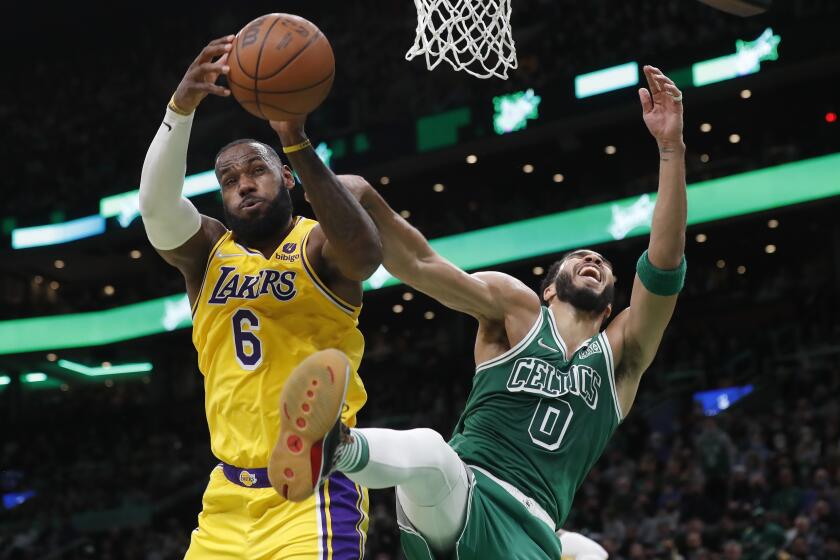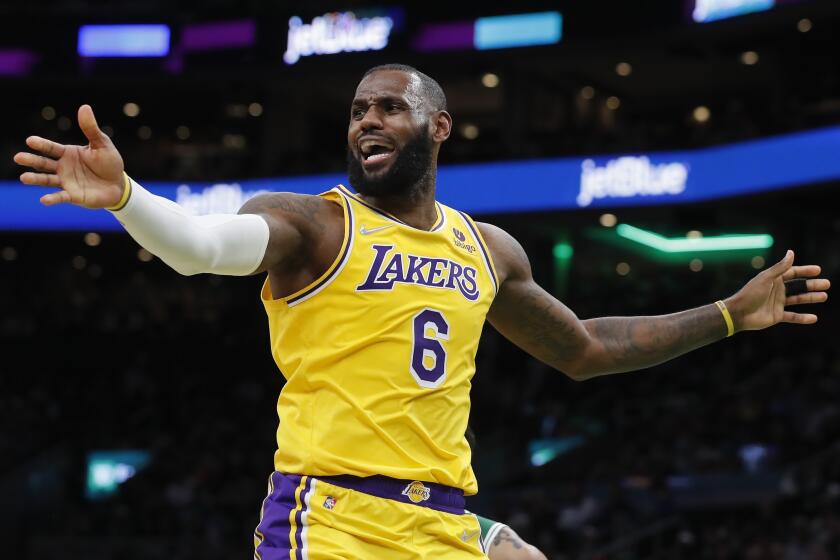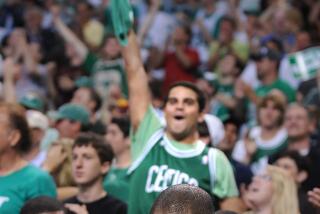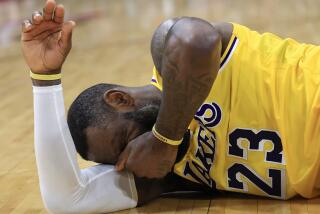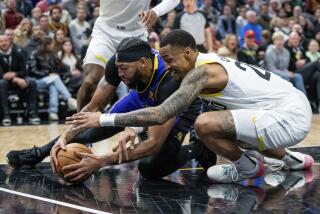Column: Does anyone care what LeBron James thinks about China? His critics certainly do
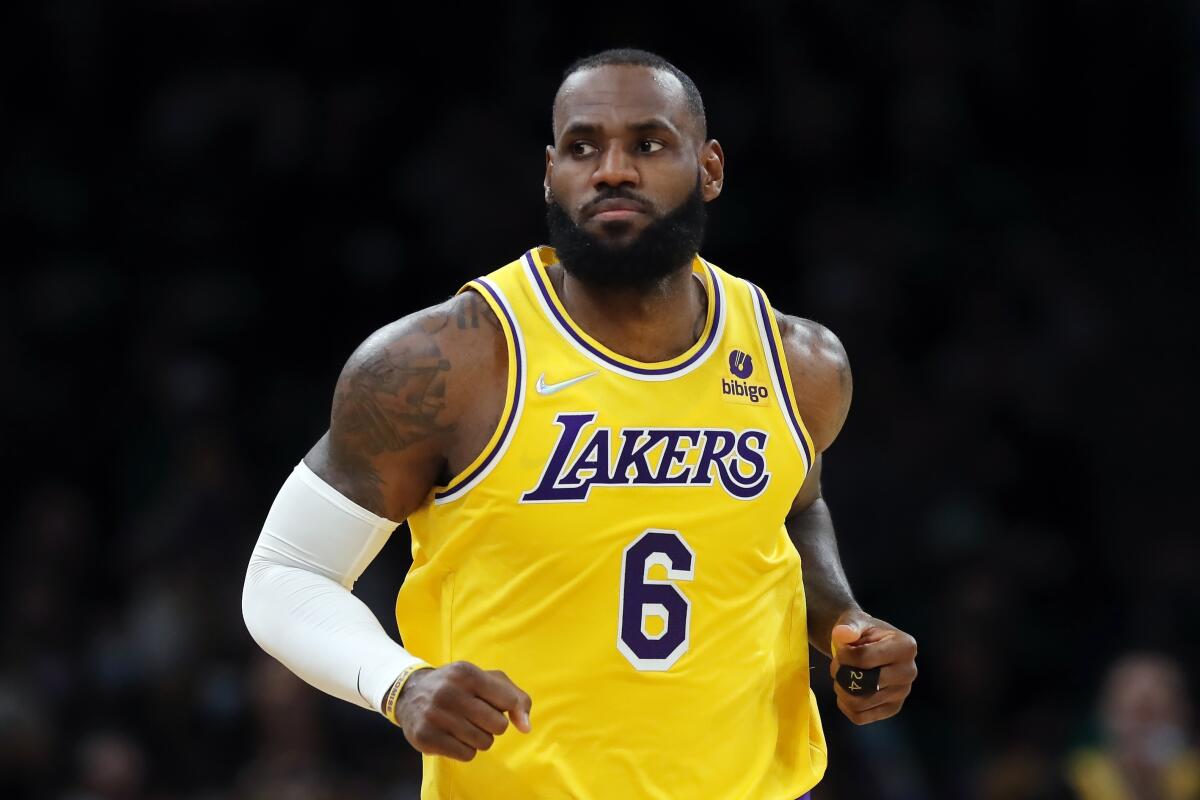
BOSTON — A game can’t just be a game anymore.
So, when LeBron James returned to the Lakers’ lineup against the Boston Celtics on Friday night, the story couldn’t just be that the best player of his generation was coming back from an eight-game absence to take on his team’s historic rival in its arena.
Everything is now content to be consumed by a short-attention-span, social-media-addicted public.
Like, how Celtics center Enes Kanter was wearing shoes criticizing James’ commercial ties to China.
Or how the game was staged on a day when teenage vigilante Kyle Rittenhouse was acquitted of charges that included intentional homicide and reckless endangerment.
LeBron James, making his return after missing eight games because of injury, couldn’t prevent the Lakers from losing big to the Boston Celtics.
What James the civic leader would have to say about Kanter’s footwear was as anticipated as what James the basketball player could do to elevate the mishmash Lakers.
Which isn’t to say James and other athletes should just stick to sports.
But this particular spectacle felt as forced as one of the countless bricks Russell Westbrook has thrown up this season.
Sometime over the last couple of years, the realization that athletes could have serious opinions on social and political issues turned into an assumption that they do. They are now expected to have opinions on everything.
It’s one thing to report on opinions athletes go out of their way to share. But coaxing them into offering thoughts on subjects unrelated to their work has a disingenuous feel. There has been a lot of this kind of journalism in recent years, its contrived nature eliciting cynicism.
The result is few people now are actually interested in what they have to say.
The public wants confirmation, not guidance. People have already made their decisions. Regarding most subjects, they look to athletes not as leaders, but as symbols of what they view to be the right and wrong ways of thinking.
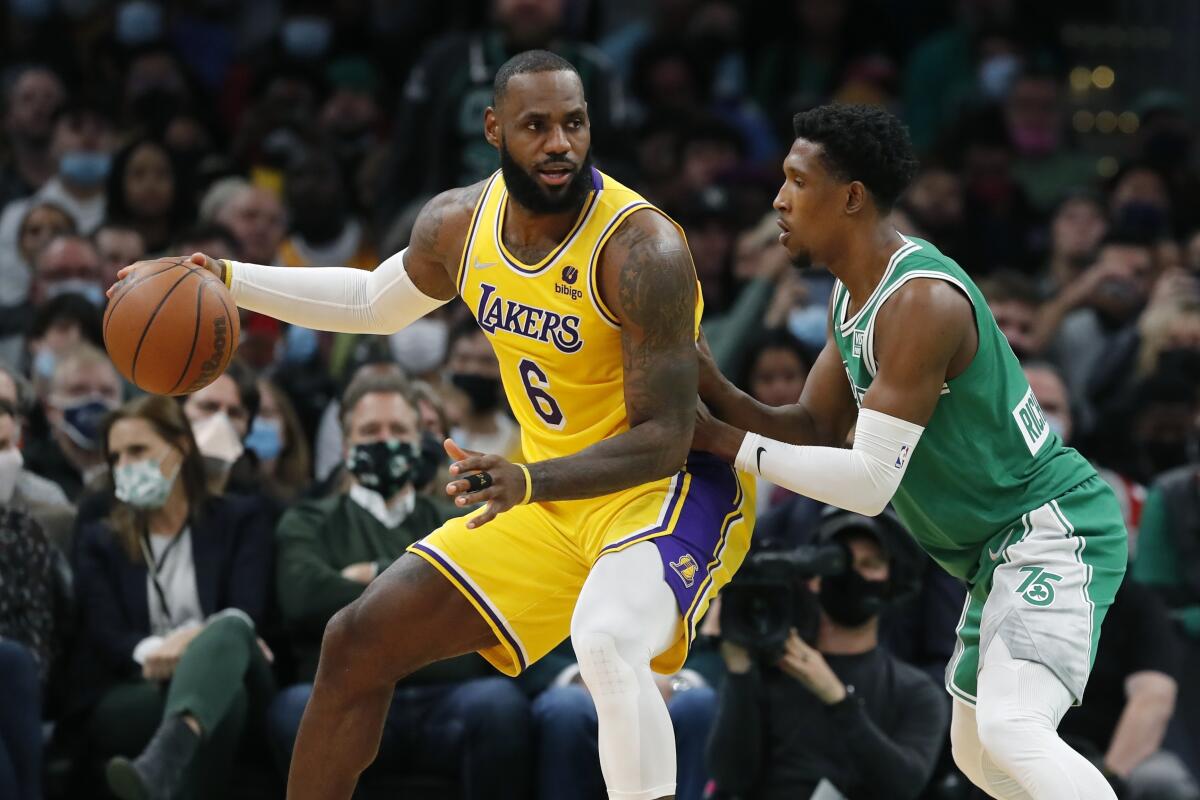
A human rights advocate who has criticized the president of his native Turkey, Kanter seems genuinely concerned about the situation in China. But people waiting for James to respond to Kanter’s criticism — “Money over Morals for the ‘King,’” Kanter tweeted the day before — weren’t interested in hearing what he had to say about China. What they were interested in doing was using China’s human rights record to discredit James’ advocacy of social justice.
If as many people cared about China as there are people who care about what James thinks about China, there would be a more robust national conversation about whether the United States should boycott the upcoming Winter Olympics in Beijing.
James questioned the sincerity of Kanter, pointing to how he walked by him in the hallway rather than stop to talk about the matter.
“I don’t give too many people my energy,” James said. “He’s definitely not someone I would give my energy to.”
A similar dynamic was in play regarding his anticipated reaction to the Rittenhouse verdict, which is why the subject didn’t even come up for James afterward.
The Lakers prepare to play at Detroit after a loss in Boston that included a third-quarter collapse. “There should be some sense of urgency,” LeBron James said.
The 130-108 loss to the Celtics offered plenty of fodder. In this instance, the game was just a game. The other storylines felt manufactured.
The Lakers, who won only three of the eight games James recently missed because of a strained abdominal muscle, were an entirely different team with their best player on the floor.
For a quarter.
With James as the primary ballhandler, the Lakers moved the ball effectively and opened up a 38-30 lead over the first 12 minutes.
Anthony Davis was the primary beneficiary of this improved offensive rhythm, scoring 15 points in the opening period. James had seven points in the quarter.
The Lakers were outscored in each of the next three quarters.
They went into halftime with a 61-60 lead, only to nearly play their way out of the game in a third quarter in which they scored only 21 points.
“We have to find ways to score in the third quarter,” Davis said. “That’s been our kryptonite all season.”
Trevor Noah asks people to get a grip about L.A.’s Staples Center becoming Crypto.com Arena. ‘You don’t need to get that nostalgic about it. It’s a company.’
That wasn’t their only problem. They couldn’t defend, either. Or rebound. Or have Davis sustain his early dominance. Or figure out how to integrate Westbrook in their James-led offense. The confluence of shortcomings resulted in them being outscored by a 70-47 margin in the second half by a team missing Jaylen Brown.
The inability to stop the Celtics kept the Lakers from attacking in transition. Their offense was further slowed by the number of fouls they committed. The Celtics attempted 38 free throws, 14 more than the Lakers.
There will be a day when James’ voice on off-the-court matters will be as important as it was last year when there were widespread protests against racial injustice. This isn’t that time.
That’s why the enduring image of Friday night is that of James complaining to the referees. And that’s why the most memorable comments made by James were the words of reassurance he offered in the wake of the humbling defeat.
“For me,” he said, “it’s never as bad as it may seem and it’s never as good as it may feel. So, I stayed even-keeled throughout the whole journey. I understand this is a huge [undertaking]. It’s a process for us. And I’ve always felt comfortable when things are uncomfortable so I look forward to the process of us trying to get better, and us getting better. We will get better. We will improve.”
More to Read
All things Lakers, all the time.
Get all the Lakers news you need in Dan Woike's weekly newsletter.
You may occasionally receive promotional content from the Los Angeles Times.

